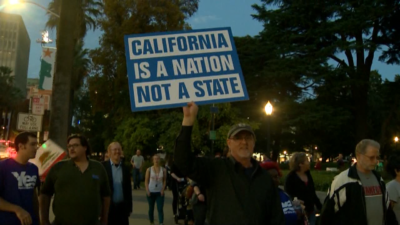On Thursday, the California Secretary of State announced that proponents of a constitutional amendment seeking the state’s secession from the United States can begin collecting signatures to put the proposal on the 2018 ballot.
 Recent polling shows the move – spawned from residents disgruntled about Republican Donald Trump’s historic victory in the 2016 presidential election – is backed by roughly a third of Californians, the Sacramento Bee reports.
Recent polling shows the move – spawned from residents disgruntled about Republican Donald Trump’s historic victory in the 2016 presidential election – is backed by roughly a third of Californians, the Sacramento Bee reports.
But analysis of the current electoral map shows that without California, Republicans would likely retain control over Congress and the White House and the country for the foreseeable future.
Without California, the next POTUS would need 242 Electoral College votes to win, which would leave Democrats scrambling to pick up several states to make up the difference. For the 2016 election, for example, Democrats would have had to of won both Texas and Florida to claim victory. Or Democrats would have had to pick up a slew of smaller states, like Michigan, Wisconsin, Ohio, and North and South Carolina, in addition to the states Democrat Hillary Clinton took in 2016.
Even with Michigan, Wisconsin, Pennsylvania and Ohio added to the blue column last year, Democrats still would have lost.
Official vote totals show Clinton won the popular vote in the 2016 election by about 2.8 million nationwide, and about 4.2 million of her votes came from California, according to Wikipedia. In other words, without California, Trump would have won both the Electoral College and popular vote in a landslide.
California’s secession would also significantly diminish what’s left of the Democratic Party’s influence in Congress. Currently, 38 Democrats and 14 Republicans represent The Golden State in the U.S. House. Without them, the House would shift to 226 Republicans and 155 Democrats, with two vacant seats, nearly giving the GOP a supermajority.
And without the state’s two Democratic senators, the upper chamber would tilt even more toward Republicans — 44-52 — with two independents.
The liberal proponents of the California secession aim to remove language from the state constitution that identifies California as “an inseparable part of the United States of America, and the United States Constitution as the supreme law of the land.” They have until July 25 to collect signatures from 585,407 voters to put the proposal on the November 2018 ballot, according to the Bee.
A Reuters poll released Monday shows roughly 32 percent of California residents support the so-called “Calexit,” up significantly from the last poll in 2014 that registered only 20 percent support.
Reuters reports:
In Lodi, California, Democratic party activist Bruce Rubly, who told Reuters/Ipsos pollsters that he “strongly supported” California secession, said he thinks it could happen if Trump and the Republicans who dominate the U.S. Congress impose conservative policies on such issues as the environment, immigration and marijuana legalization.
“There’s a whole series of things that are going to get Californians riled up,” said Rubly, 68. “And if he pushes those buttons in the wrong way, there’s going to be hell to pay.”
If the Calexit initiative succeeds, and voters approve the measure on the 2018 ballot, the state would hold a special statewide election in March 2019 to ask voters if they want the state to become an independent country.
The measure would also likely need approval of two-thirds of Congress and three-quarters of states to amend the U.S. Constitution, a hurdle that doesn’t seem impossible considering the current Republican domination of American government.
The question then centers on whether the Democratic National Committee can afford to lose a state that’s a cornerstone of it’s base, or whether they’ll fight their liberal allies by pouring time, money and energy into killing the Calexit movement in its infancy.
Leave a Comment
COMMENTS POLICY: We have no tolerance for messages of violence, racism, vulgarity, obscenity or other such discourteous behavior. Thank you for contributing to a respectful and useful online dialogue.